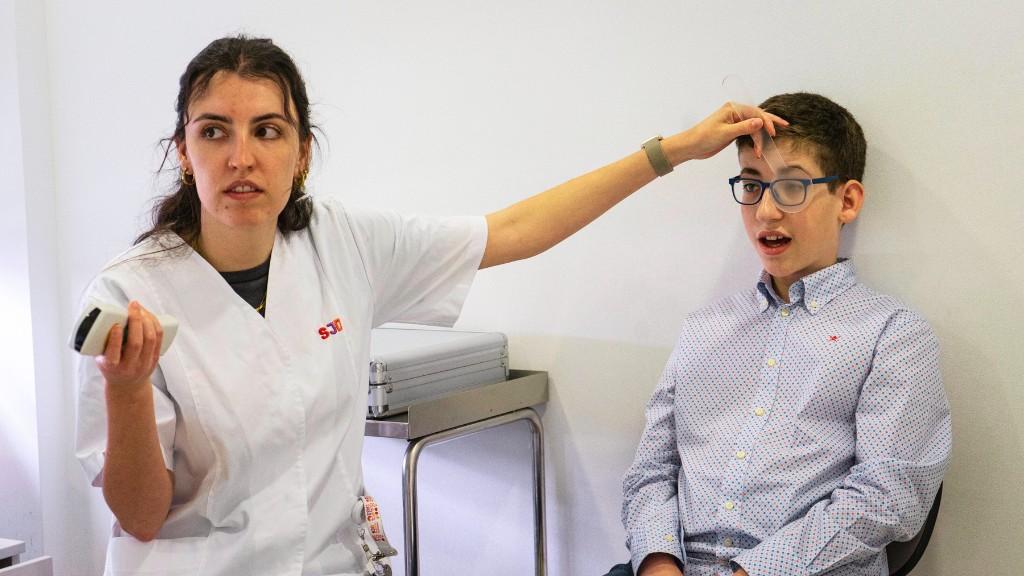
The mother of a child with Prader-Willi syndrome tells us about how her son and family benefit from the hospital’s grouping of appointments for several specialists into one day for patients with rare diseases.
Maria Alba knew that her son Oriol had a rare disease, Prader-Willi syndrome, shortly after he was born. ‘I remember that the day before, I already knew that something wasn’t right because, during my pregnancy, he didn't move. When he was born, he still didn't move and his testicles hadn't descended. Our medical team took him away and, shortly after, a nurse told me she thought my son had Prader-Willi syndrome because there was a similar case in her family,’ she recalls.
Oriol was born in a private healthcare centre in Barcelona at eight o’clock in the evening. Twelve hours later, first thing in the morning, he was transferred to the SJD Barcelona Children's Hospital. ‘When doctors told us that our son had Prader-Willi, I asked for voluntary discharge, packed our bags, and we came to the SJD Barcelona Children's Hospital. When we arrived, Oriol was admitted to the ICU for monitoring. He spent 15 days there, and we didn't get to go home until three weeks later. It was here at the hospital that the genetic test was done confirming Oriol has Prader-Willi syndrome,’ remembers Maria Alba.
Oriol is now 13 years old and has to attend check-ups and monitoring with several departments: Neurology, Endocrinology, ENT, Traumatology, Ophthalmology, Dentistry, etc. ‘At first, our appointments were all on different days. We live in a town in Lleida, and it’s a four-hour round trip. It was a hassle,’ notes Maria Alba.
She continues to recall her experience with all of the appointments, noting that ‘once we had to come to the hospital two or three times in one week because each department gave us an appointment on a different day. We ended up choosing to only come to appointments that we thought were most important, and tried to attend the others somewhere closer to home through our insurance, to save us the travel. Now we only need to come once every six months, and on the day we get to see all of the specialists needed.’
Seven years ago, the staff who attended to children with Prader-Willi syndrome decided to group together all of the required appointments into one day, making it easier for families and avoiding unnecessary journeys. The idea also led to better monitoring and follow-up for patients. Now there are fewer emergency appointments and fewer hospital admissions, according to results of a study.
‘For us, it has been fantastic. Now we only come twice a year and, when we do, we can speak to every single professional we need and ask any questions we might have. When we come to the hospital, he gets a general check-up.’ The mother also appreciates being able to interact with other families. ‘We meet other families in the waiting room, whose children have the same disease. We can talk to them, share our experiences…’ she notes.
Importance of case management for families
Maria Alba also stresses the importance of the case manager, a figure that was introduced at the SJD Barcelona Children's Hospital to act as the link between families, staff and hospital resources. ‘Having someone like Mercè Bolasell is a huge help to us, because, at times, appointments can be delayed and you don't have enough time to get to the next one. She sorts everything out and you don't have to worry about a thing,’ she explains.
‘The experience would be perfect if Oriol's treatment, human growth hormone, which he'll need to take until adulthood, was given every three or six months, and we didn't have to come for it every month,’ she adds. Human growth hormone is prescribed to patients with this syndrome because it helps increase their height, metabolism and muscle mass, as well as reducing excess weight gain. Children with Prader-Willi syndrome experience abnormal hunger satiety, meaning they are not satiated easily and want to eat constantly. This forces families to monitor the child's access to food. In Oriol's case in particular, Maria Alba explains that they have had to put an alarm in their kitchen.
For Oriol, coming to his hospital appointment is a special occasion. He loves coming to SJD and picks out his clothes specially for coming. He comes well prepared with his questions and queries for the doctors all written down. ‘He is very happy to come because he's treated well. They're very attentive to him and he likes that,’ explains Maria Alba.




